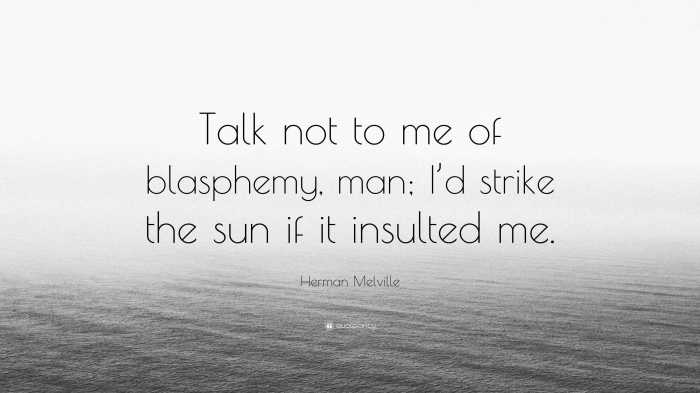Id strike the sun if it insulted me – The audacious phrase ‘I’d strike the sun if it insulted me’ captures the essence of human pride, defiance, and the audacity to challenge even the most formidable forces. Throughout history, this expression has resonated with individuals and groups, serving as a potent symbol of their unwavering resolve.
This exploration delves into the origins, interpretations, and profound implications of this evocative phrase, offering a nuanced understanding of its cultural, psychological, and philosophical significance.
The phrase’s origins can be traced back to ancient cultures, where it symbolized a fierce determination to confront adversity and defend one’s honor. Over time, it has been adopted by diverse individuals and groups, from warriors and revolutionaries to artists and philosophers, each imbuing it with their unique perspectives and motivations.
Contextual Overview: Id Strike The Sun If It Insulted Me

The phrase “I’d strike the sun if it insulted me” is a bold declaration of defiance and self-confidence.
It originated in the 16th century, when it was used by the English poet John Skelton in his poem “The Garland of Laurel.” In the poem, Skelton uses the phrase to express his contempt for those who would dare to criticize him.
Literal Meaning
The literal meaning of the phrase is that the speaker would be willing to attack the sun, even though it is much larger and more powerful than they are.
Figurative Meaning
The figurative meaning of the phrase is that the speaker is not afraid to stand up for themselves, even against those who are more powerful than they are.
Expressions of Pride and Defiance

The phrase “I’d strike the sun if it insulted me” has been used as a powerful expression of pride and defiance by individuals and groups throughout history. It conveys a sense of unwavering resolve and an indomitable spirit.
One notable example is the use of the phrase by the suffragettes in the early 20th century. These women, fighting for the right to vote, adopted the phrase as a symbol of their determination to overcome the obstacles they faced.
The phrase became a rallying cry for their movement, inspiring them to persevere in the face of opposition and ridicule.
Individuals Who Embodied the Phrase
- Martin Luther King Jr.:The renowned civil rights leader frequently invoked the phrase to convey his unwavering commitment to justice and equality. He believed that even the most formidable obstacles could be overcome with determination and courage.
- Nelson Mandela:The anti-apartheid activist and former president of South Africa used the phrase to express his defiance against the oppressive regime. He remained steadfast in his fight for freedom, even during his imprisonment on Robben Island.
Psychological Motivations
The use of the phrase “I’d strike the sun if it insulted me” is often driven by deep-seated psychological motivations. These motivations include:
- Self-esteem:The phrase conveys a strong sense of self-worth and confidence. It suggests that the individual is unwilling to tolerate any form of disrespect or insult.
- Resilience:The phrase reflects an unwavering determination to overcome challenges. It implies that the individual will not be deterred by obstacles or adversity.
- Empowerment:The phrase empowers individuals to stand up for themselves and their beliefs. It provides a sense of agency and control, even in situations where they may feel powerless.
Literary and Artistic Interpretations
The phrase “I’d strike the sun if it insulted me” has resonated in the literary and artistic realms, inspiring works that explore the themes of challenging and defying powerful forces.
These interpretations often employ common motifs and symbols to convey the idea of defiance and resilience. The sun, as a celestial body representing power and authority, serves as a potent metaphor for the oppressive forces that individuals or groups may face.
Literary Works
- “Prometheus Bound” by Aeschylus:In this Greek tragedy, the Titan Prometheus defies Zeus, the king of the gods, by stealing fire and giving it to humanity. Prometheus’s act symbolizes the human spirit’s indomitable will to resist oppression.
- “Hamlet” by William Shakespeare:Hamlet’s soliloquy “To be or not to be” reflects his inner struggle against the powerful forces that seek to control his destiny. Hamlet’s defiance lies in his contemplation of rebellion and his ultimate decision to confront his fate.
- “Invisible Man” by Ralph Ellison:This novel explores the experiences of an African American man living in a racist society. The protagonist’s journey represents the resilience and defiance of marginalized individuals against oppressive systems.
Art Pieces
- “Guernica” by Pablo Picasso:This painting depicts the horrors of war and the suffering of innocent civilians. Picasso’s use of distorted figures and muted colors conveys the impact of violence and the defiance of those who resist it.
- “The Scream” by Edvard Munch:This iconic painting expresses the existential angst and fear that individuals experience in the face of overwhelming forces. The screaming figure represents the human spirit’s struggle against the unknown and the desire to defy the limitations imposed by society or nature.
- “The Starry Night” by Vincent van Gogh:This painting evokes a sense of cosmic wonder and the artist’s defiance against his mental illness. The swirling sky and the radiant stars symbolize the indomitable spirit that persists even in the face of adversity.
The use of the phrase “I’d strike the sun if it insulted me” in creative expressions empowers individuals and groups to challenge oppressive forces and assert their agency. It serves as a rallying cry for defiance and a reminder of the human spirit’s capacity for resilience and resistance.
Philosophical Implications

The phrase “I’d strike the sun if it insulted me” carries profound philosophical implications, challenging fundamental notions of human arrogance and the limits of power. It encapsulates the idea that individuals possess the agency to defy even the most formidable forces, embodying a spirit of defiance and self-assertion.
The Nature of Human Arrogance
The phrase suggests that humans are capable of hubris, overestimating their own abilities and significance. By presuming to strike the sun, the speaker asserts their own superiority, even over celestial bodies. This hubristic attitude can lead to reckless actions and a disregard for consequences.
The Limits of Power
Conversely, the phrase also acknowledges the limits of human power. Despite our aspirations, we are ultimately subject to the laws of nature and the vastness of the universe. Striking the sun would be an impossible feat, demonstrating the futility of human attempts to control or conquer everything.
Challenging Authority and Fate, Id strike the sun if it insulted me
The phrase reflects a philosophical perspective that challenges authority and fate. It suggests that individuals should not passively accept their circumstances but rather strive to shape their own destinies. By asserting their willingness to strike the sun, the speaker demonstrates a refusal to bow to external forces or predetermined outcomes.
Ethical Considerations
Using the phrase to justify actions raises ethical considerations. While it may inspire courage and determination, it can also lead to reckless and potentially harmful behavior. The pursuit of self-assertion should not come at the expense of others or the environment.
Ethical principles should guide the use of such language, ensuring that it empowers individuals without promoting harm or irresponsibility.
Cultural and Societal Influences

The phrase “I’d strike the sun if it insulted me” has had a profound impact on cultural norms and social movements. Its defiant and unapologetic stance has resonated with individuals and groups who seek to assert their power and challenge authority.
Popular Culture
The phrase has been referenced in popular culture, including music, literature, and film. For example, the song “I’d Strike the Sun” by the band Rise Against uses the phrase as a metaphor for the determination and resilience of the human spirit in the face of adversity.
Language and Collective Consciousness
The phrase has become a part of the collective consciousness, representing a defiant attitude towards those in power. It is often used to express anger, frustration, or a sense of injustice.
Social Contexts
The use of the phrase in different social contexts can have varying consequences. In some situations, it may be seen as a harmless expression of frustration, while in others it may be interpreted as a threat or provocation.
General Inquiries
What is the historical context of the phrase ‘I’d strike the sun if it insulted me’?
The phrase has roots in ancient cultures, where it symbolized a fierce determination to confront adversity and defend one’s honor.
How has the phrase been used to express pride and defiance?
Individuals and groups have adopted the phrase as a symbol of their unwavering resolve, using it to convey their refusal to tolerate insult or injustice.
What are some literary and artistic interpretations of the phrase?
Literary works and art pieces have explored the theme of challenging or defying powerful forces, often using the phrase as a motif or symbol to convey the protagonists’ indomitable spirit.
What are the philosophical implications of the phrase?
The phrase raises questions about the nature of human arrogance, the limits of power, and the ethical considerations of challenging authority or fate.
How has the phrase influenced cultural norms and social movements?
The phrase has been used to shape cultural norms and inspire social movements, serving as a rallying cry for those seeking to challenge oppression or injustice.